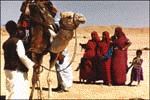 |
The Cotsen Advanced Seminar on the
Archaeology of Mobility
Nomads in the Old and in the New World
|
|
|
The Cotsen
Institute of Archaeology is a research unit at the
University of California, Los Angeles established in
1973 to promote the comprehensive study of the human
past. It provides an opportunity for faculty, staff,
graduate students, research associates, volunteers and
the general public to gather together and share their
exploration of ancient societies. Recently an
investigation of the state of affairs in the study of
nomads has been initiated by the Cotsen Institute.
Many archaeologist behave like nomads. They travel
around the world looking for places of interest. Usually
they find these in remote areas where the climate is
harsh and resources are scarce. Here they will settle
for weeks or even months at the time. But they will
leave immediately once the site no longer offers them
new information, or their funding runs out. And soon
they will start preparing for their next expedition.
Still, nomads are rarely studied by archaeologists. They
often are part of the fringes of a society and leave few
traces of their activities. The archaeologists that have
entered this challenging field of study mostly
concentrate on prehistoric periods. A better
understanding of nomadic people in the past will not
only fill a gap in our knowledge of human history. It is
also very significant for the empowerment of those
currently adhering to a nomadic life-style. Their
further marginalization by the rapid development of
those around them seems a world-wide phenomenon.
UCLA has brought together an international group of
about 40 archaeologists, anthropologists and historians
with an interest in hunter-gatherers, pastoral nomads,
gypsies and Bedouin. This group will get together to
discuss this topic, which will be publish in the Cotsen
Advanced Seminar Series. The volume on nomads, is
expected to be the authoritative volume on the subject
for years to come.
Contributions to this volume originate from three
sources. First are the chapters submitted by invited
authors, before the deadline of 19 June 2004. These
contributions will be reviewed by other members of the
research group before being accepted for publication.
Second are the proceedings of a
panel during the 69th Annual Meeting of the
Society for American Archaeology (March 31-April 4, 2004
in Montreal, Canada), one of the most important
archaeological forums in the world. The participation of
eight speakers, one co-author and one discussant is
funded by the individual contributors, or their
employer.
The third source of contributions is a
workshop to be held in Los Angeles, 22-24 June
2004. This will comprise presentations, but also a
session during which previous contributions are
discussed. Other planned events are a video conference
meeting, facilitated by Internet2 and UCLA's
Visualization Portal, and a lunch hosted by the
Department of Near Eastern Languages and Cultures.
The deadline for the submission of contributions or
revisions is Monday 15 November 2004, publication of the
volume is expected shortly thereafter. Issues that will
be addressed include definitions and terminology, the
transition between nomadic and settled life-styles and
the discrepancies between our historical and
archaeological sources. |
Archaeology
of Mobility: Old World and New World
Nomadism
edited by Hans Barnard and Willeke
Wendrich
There have been
edited books on the archaeology of nomadism
in various regions, and there have been
individual archaeological and
anthropological monographs, but nothing with
the kind of coverage provided in this
volume. Its strength and importance lies in
the fact that it brings together a worldwide
collection of studies of the archaeology of
mobility. This book provides a ready-made
reference to this worldwide phenomenon and
is unique in that it tries to redefine
pastoralism within a larger context by the
term mobility. It presents many new ideas
and thoughtful approaches, especially in the
Central Asian region (Cotsen Advanced Seminars 4,
Cotsen Institute of Archaeology 2008).
|
|
Hans Barnard
is a Research Associate at the Cotsen Institute, Willeke
Wendrich is Assistant Professor in Egyptian
Archaeology at the Department of Near Eastern Languages
and Cultures at UCLA and affiliated with the Cotsen
Institute. Both have done research on the pastoral
nomads in the desert between the Nile and the Red Sea in
the past (the Blemmyans) and at present (the Ababda).
They have brought together an international group of
about 40 archaeologists, anthropologists and historians
with an interest in hunter-gatherers, pastoral nomads,
gypsies and Bedouin. This group will publish a Cotsen
Advanced Seminar on nomadism, which is expected to be
the authoritive volume on the subject for years to come.
Donors who decide to contribute to the success of this
important and exciting project will find their names
mentioned on this website as well as in all further
communications. In due course they will obviously also
receive a copy of the final publication. If you would
like to contribute, to make suggestions or to obtain
additional information, please contact us at <nomads@ucla.edu>. |
|
|
|
|
The
fourth Cotsen Advanced Seminar on Nomadism
is made possible by:
- the Cotsen Institute of Archaeology
at UCLA;
- UCLA Department of Near Eastern
Languages and Cultures;
- UCLA International
Institute, Special Academic Cooperative
Projects;
- and all individual
participants.
|
|

|
Cotsen Institute of
Archaeology at UCLA
P.O.-box 951510; Los Angeles, CA 90095 |
 |
|

